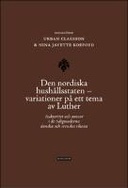Explore

Den nordiska hushållsstaten
0 Ungluers have
Faved this Work
Login to Fave
Martin Luther's concept of society as a household, ruled by parents, established a model of social organisation that would become important in the Nordic countries in the 17th and 18th centuries. With the dismantling of the Nordic monasteries in the Lutheran Reformation, households became the new framework for Christian life. The Ten Commandments replaced the rules of the monasteries. Similarly, morning and evening prayers in the households replaced the tidal prayers of the monasteries. At various levels, the household was the given and legitimate form of community and organisation. The relationship between parents and children therefore became normative far beyond what we would today call the biological family.
In older Nordic research, the important historical role of the household is usually associated with the Swedish church historian Hilding Pleijel and his thesis about the prevalence of the Household idea. Based on new research, the authors of this anthology confirm Pleijel's basic assumption about the central role of the household. However, this is done in a way that Pleijel himself would hardly have imagined.
After two chapters updating the state of research, a number of studies follow in which the historical and at the same time theological roles of the household are analysed at different levels. In the two Nordic kingdoms, the household is analysed in everyday life, in church teaching and as an overall household state. The anthology makes a special contribution by linking research fronts from Denmark and Sweden and offers comparative perspectives on why the household was given such similar but at the same time so different forms.
This book is included in DOAB.
Why read this book? Have your say.
You must be logged in to comment.
